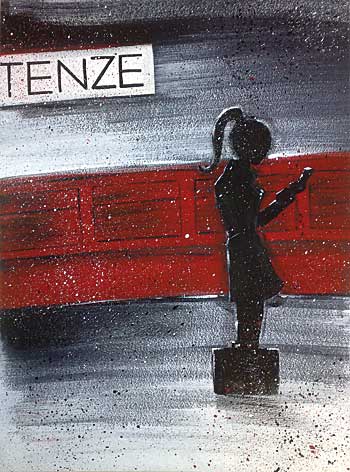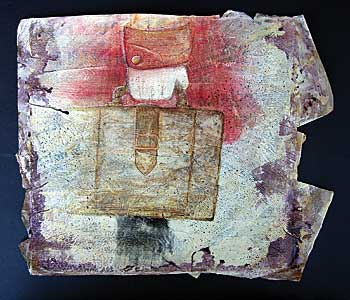Cristina Maffei Suomi
Francesca Danzini illustrations
 People leave for various reasons; they leave their home, their country, sometimes their state to move on a temporary or indeed permanent basis to another place. In all of the above cases, people pack, more or less accurately, a suitcase with clothes, books and food that they might need during their journey. We very often pack things that remind us of the place where we were born and that firmly imprint our personality, our lifestyle. This suitcase accompanies us everywhere, to meet our more real and contingent needs.We often take objects out of it to show or give to others in order to consolidate our origin and highlight it. There is however another much less visible and palpable suitcase, that of memories, of knowledge, of experiences, of a life lived beforehand. It doesn't matter how long was the period spent in our homeland with our family of origin , it is always the most important period of our lives, the one that leaves an indelible trace in our mind that we will tell stories about throughout our whole lives. Calling to mind experiences and testimonies is an action that is a privilege for man and it allows him to re-experience those facts and situations in order to draw strength, teaching and maturity from them, but sometimes sadness, discouragement and anger. Both in its positive and negative aspects, memory is essential because forgetting and not remembering it means no longer recalling and this is a refusal of the past, of a part of life that formed our bodies, our character, our intelligence. The life that we live elsewhere is the logical consequence of our choices and dreams at the basis of which there is the search for something new and different, the desire for change.
People leave for various reasons; they leave their home, their country, sometimes their state to move on a temporary or indeed permanent basis to another place. In all of the above cases, people pack, more or less accurately, a suitcase with clothes, books and food that they might need during their journey. We very often pack things that remind us of the place where we were born and that firmly imprint our personality, our lifestyle. This suitcase accompanies us everywhere, to meet our more real and contingent needs.We often take objects out of it to show or give to others in order to consolidate our origin and highlight it. There is however another much less visible and palpable suitcase, that of memories, of knowledge, of experiences, of a life lived beforehand. It doesn't matter how long was the period spent in our homeland with our family of origin , it is always the most important period of our lives, the one that leaves an indelible trace in our mind that we will tell stories about throughout our whole lives. Calling to mind experiences and testimonies is an action that is a privilege for man and it allows him to re-experience those facts and situations in order to draw strength, teaching and maturity from them, but sometimes sadness, discouragement and anger. Both in its positive and negative aspects, memory is essential because forgetting and not remembering it means no longer recalling and this is a refusal of the past, of a part of life that formed our bodies, our character, our intelligence. The life that we live elsewhere is the logical consequence of our choices and dreams at the basis of which there is the search for something new and different, the desire for change.  Whatever the reason, there is always the laceration of the separation that is renewed each time we return and then depart again. But between those who remain and wait and those who leave and sometimes return, there is the life that is our history and that, with the lives of the people we meet in the world, generates the history of men. Then how can we fail to recall the story of the Italian communities abroad, our fellow countrymen and women who make up another Italy in the world, outside of its natural confines! These people, who are integrated into the social, economic and political structures of other states, are those who speak of our land. In every act of their existence, in daily life, they play an important and meaningful role in so far as they possess a special wealth: a double culture, or a multiculturalism that flows forth from their knowledge of languages, customs, ways of life, values belonging to different groups. This multiple identity is the winning card for migrants who know how to use their knowledge to bring a new and vital lymph to the society in which they live.
Whatever the reason, there is always the laceration of the separation that is renewed each time we return and then depart again. But between those who remain and wait and those who leave and sometimes return, there is the life that is our history and that, with the lives of the people we meet in the world, generates the history of men. Then how can we fail to recall the story of the Italian communities abroad, our fellow countrymen and women who make up another Italy in the world, outside of its natural confines! These people, who are integrated into the social, economic and political structures of other states, are those who speak of our land. In every act of their existence, in daily life, they play an important and meaningful role in so far as they possess a special wealth: a double culture, or a multiculturalism that flows forth from their knowledge of languages, customs, ways of life, values belonging to different groups. This multiple identity is the winning card for migrants who know how to use their knowledge to bring a new and vital lymph to the society in which they live.